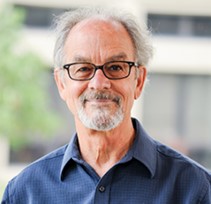William Scott (Science)
Chemical Biology and SDGs 3 (Health), 4 (Education), 10 (Equality) & 17 (Partnerships)
Dr. William L. Scott, PhD, is a Research Professor who teaches as part of the Department of Chemistry and Chemical Biology at IUPUI’s School of Science. Dr. Scott earned his Bachelor of Arts (BA), Chemistry, from Williams College in 1967, and went on to obtain his PhD in Organic Chemistry from the University of California, Los Angeles (UCLA) in 1972, followed by postdoctoral positions at Rockefeller University and CalTech. His academic career led to industry where Dr. Scott worked as a Research Scientist at Eli Lilly and Company for 27 years. In January 2002, Dr. Scott joined IUPUI as a Research Professor to engage in teaching and research. This move set the stage for a global collaboration in the effort to produce drugs for diseases in the developing world.
D3: Distributed Drug Discovery
In today’s society, pharmaceutical companies play a crucial role in the development of drugs. However, due to their capitalist philosophy, these companies focus on drug development for developed countries since this is where drug sales are high, in turn boosting profits. On the flip side, this means that pharmaceutical companies do not have an incentive to produce drugs for infectious diseases in the developing world, leading to a lack of drugs for diseases in low-GDP countries. Diseases for which drugs are not commonly available are often termed Neglected Diseases. An example of a neglected disease is Afghan Leishmaniasis which affects numerous Afghans every year. 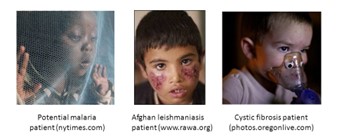
With many diseases globally falling under the neglected or infectious diseases category, Dr. Scott devised a method to convert the traditional pharmaceutical drug discovery process into a discovery process which splits the large units of the traditional discovery process into smaller, manageable, and resource-efficient steps. This program was termed D3: Distributed Drug Discovery.
The D3 program is powerful as it utilizes simple, efficient, inexpensive procedures and apparatus in conjunction with global collaborations and pre-existing educational networks. With Dr. Martin O’Donnell at IUPUI the first D3 chemistry laboratories were designed and successfully piloted in the 2004-2005 academic year. With that, Dr. Scott worked tirelessly to expand the program with global collaborators. Through an international recruitment tour in 2004, Dr. Scott identified three partners – University of Barcelona (Spain), Moscow State University (Russia), and Lublin Medical University (Poland) – and the first global D3 labs were implemented and started functioning. After setting up the labs, they initiated the synthesis of new molecules, and subsets of those compounds were replicated at the four global sites. These results validated D3’s ability to bring students and educators together across geographic and political boundaries, and aid drug discovery in a powerful and resourceful method.
Expansion and Potential of D3
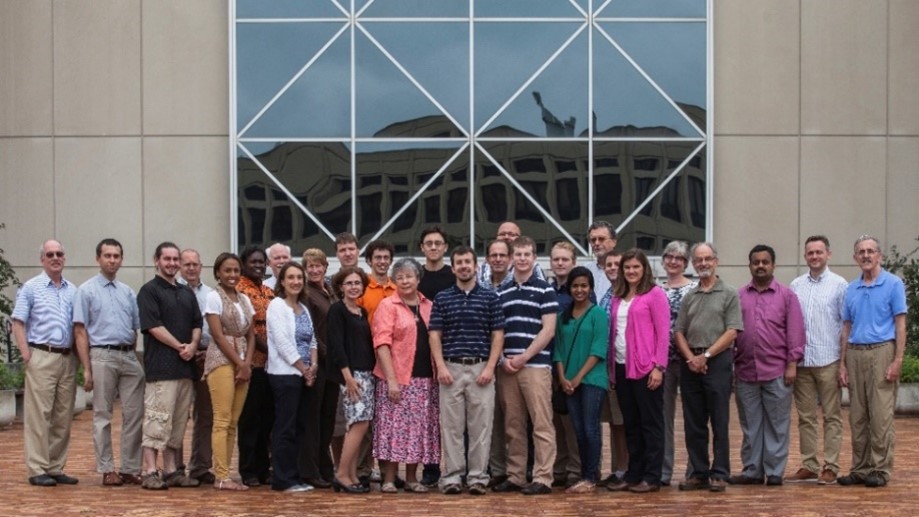 After the initial establishment of D3 global sites, and a 2009 publication co-authored by Spanish, Polish, and Russian authors, D3 achieved global recognition for its effectiveness and potential. In 2010, Dr. Scott received an invitation from Solomon Nwaka (then at the World Health Organization, Geneva) to attend the 13th African Network for Drugs and Diagnostics (ANDI) Stakeholders Meeting in Nairobi, Kenya. Here, Dr. Scott was able to learn about the opportunities and challenges for D3 in Africa. Collaborations for global sites grew with partners from Cuba, Czech Republic, Mexico City, Puerto Rico, Australia, and continental USA.
After the initial establishment of D3 global sites, and a 2009 publication co-authored by Spanish, Polish, and Russian authors, D3 achieved global recognition for its effectiveness and potential. In 2010, Dr. Scott received an invitation from Solomon Nwaka (then at the World Health Organization, Geneva) to attend the 13th African Network for Drugs and Diagnostics (ANDI) Stakeholders Meeting in Nairobi, Kenya. Here, Dr. Scott was able to learn about the opportunities and challenges for D3 in Africa. Collaborations for global sites grew with partners from Cuba, Czech Republic, Mexico City, Puerto Rico, Australia, and continental USA.
In 2013, the Inaugural International Distributed Drug Discovery workshop was organized at IUPUI by Dr. Scott. This event brought together synthetic chemists, computational chemists, and biologists from Poland, Czech Republic, Kenya, and four schools in the US with the agenda of the workshop being improvements to D3 and the building of further collaborations.
Results of D3: Synthesis of potent molecules and reagents
Since the conception of D3, students and researchers have actively participated in the synthesis of molecules with antimicrobial activity. Over the years, the powerful compounds that can be potentially produced by the D3 collaboration have been virtually cataloged. Since their synthesis is based on simple, resource-effective processes, consistently reproducible globally and with the simplest of equipment, conversion from “virtual” to “real” has a high probability of success. Furthermore, subsets of compounds available in the virtual catalog have been made by students and tested at the Australian Community for Open Antimicrobial Drug Discovery (CO-ADD) – a partner of D3. The results have led to the identification of novel student-made antimicrobial molecules, patents, and even a publication co-authored by collaborators from schools in Cuba, Australia, and four American schools.
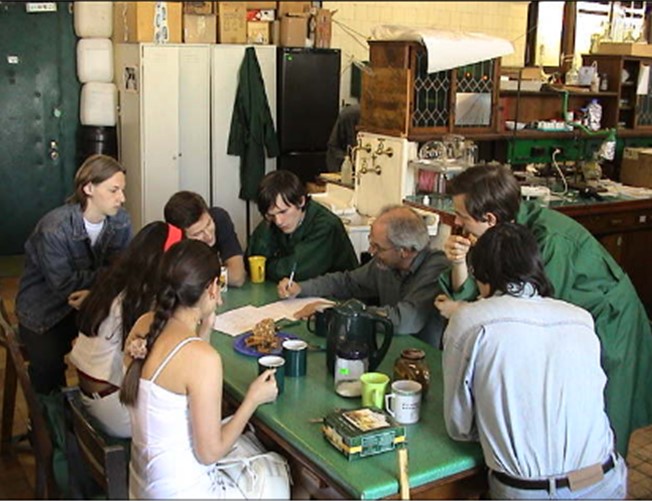 Another example of the success of D3 came after students from workshops in Puerto Rico and Mexico collaborated with students from four American schools to produce 42 new molecules which were tested by IUPUI biology students for activity against Pseudomonas aeruginosa, a cause of serious infections in patients with Cystic Fibrosis. A number of these compounds showed potential activity. Similarly, after the global influx of COVID-19 in 2020, a new undergraduate lab at IUPUI was created following the D3 protocol to produce numerous potential inhibitors of “Mpro”, an enzyme essential for the replication of the SARS-CoV-2 virus.
Another example of the success of D3 came after students from workshops in Puerto Rico and Mexico collaborated with students from four American schools to produce 42 new molecules which were tested by IUPUI biology students for activity against Pseudomonas aeruginosa, a cause of serious infections in patients with Cystic Fibrosis. A number of these compounds showed potential activity. Similarly, after the global influx of COVID-19 in 2020, a new undergraduate lab at IUPUI was created following the D3 protocol to produce numerous potential inhibitors of “Mpro”, an enzyme essential for the replication of the SARS-CoV-2 virus.
D3 and Scientific Diplomacy
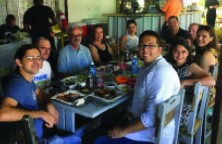 Discovery Drug Discovery (D3) has demonstrated its potential for producing disease-fighting compounds for diseases which are commonly neglected by the traditional drug discovery processes employed by large pharmaceutical companies. However, D3 has also shown advantages and capability in other avenues such as producing employment opportunities and providing research and development opportunities for students. One of the biggest avenues of benefits from D3 is Scientific Diplomacy fostered by a common goal which transcends borders and politics.
Discovery Drug Discovery (D3) has demonstrated its potential for producing disease-fighting compounds for diseases which are commonly neglected by the traditional drug discovery processes employed by large pharmaceutical companies. However, D3 has also shown advantages and capability in other avenues such as producing employment opportunities and providing research and development opportunities for students. One of the biggest avenues of benefits from D3 is Scientific Diplomacy fostered by a common goal which transcends borders and politics.
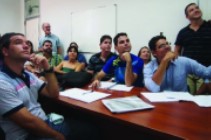
The D3 collaboration with the University of Havana is a testament to the scientific diplomacy which this program offers. Despite political tensions between the US and Cuba over the past few years, D3 collaborations have always been focused on disseminating knowledge and experience between the two countries. Furthermore, D3 does not impose first-world technologies on countries such as Cuba. Instead, the program empowers developing nations to effectively use available resources and educate students to produce powerful drugs.
In the spirit of scientific research and education conducted without geographical or political constraints Dr. Scott is extending the D3 program to Ukraine. He is scheduled in November to deliver three remote lectures on drug discovery and D3 to students and researchers in Kyiv, Ukraine. When safety permits he will travel to Kyiv to oversee a synthesis workshop and connect Ukraine to the widening network of D3 collaborators.

